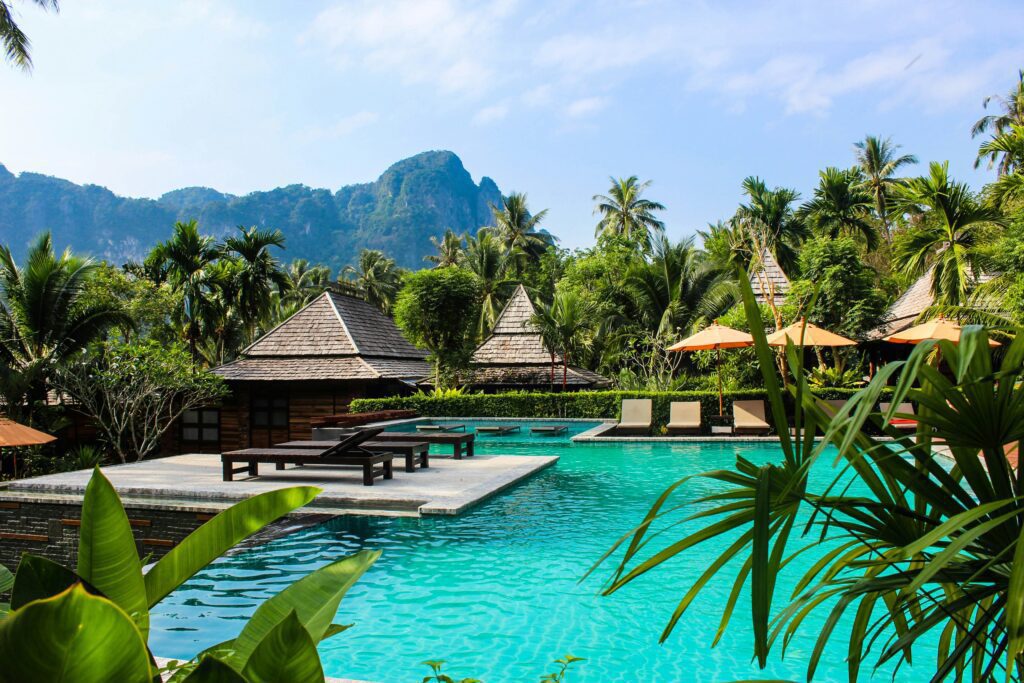Introduction to eco-friendly travel and the rise of sustainable stays
Welcome to the world of sustainable stays, where eco-friendly hotels and resorts are changing the face of the hospitality industry. With a growing focus on environmental consciousness, travelers are increasingly seeking out accommodations that align with their values and minimize their ecological footprint. From innovative design to renewable energy sources, these eco-conscious properties are paving the way for a greener future in travel. So grab your reusable water bottle and join us as we explore how sustainable stays are revolutionizing the way we experience hospitality!
The benefits of eco-friendly hotels and resorts for the environment
Eco-friendly hotels and resorts are not just a trend, but a necessary step towards preserving our environment. These sustainable stays offer numerous benefits for the planet, making them an attractive choice for environmentally conscious travelers.
One of the primary advantages of eco-friendly accommodations is their reduced carbon footprint. By implementing energy-efficient practices, such as using solar panels, LED lighting, and smart thermostats, these establishments significantly decrease their energy consumption and reliance on fossil fuels. This helps to lower greenhouse gas emissions and combat climate change.
Furthermore, eco-friendly hotels prioritize waste reduction and management. They implement recycling programs throughout the property and encourage guests to participate in sustainable practices by providing recycling bins in rooms and public areas. Some even compost organic waste to further minimize their environmental impact.
Water conservation is also a key focus for eco-friendly accommodations. Through initiatives like low-flow showerheads, dual-flush toilets, rainwater harvesting systems, and water-saving landscaping techniques, these establishments strive to reduce water consumption without compromising guest comfort.
In addition to these direct environmental benefits, eco-friendly hotels often support local communities through various means such as sourcing locally grown food for their restaurants or partnering with local artisans for decor or amenities. This fosters economic growth while minimizing transportation-related carbon emissions from importing goods from afar.
By choosing to stay at an eco-friendly hotel or resort during your travels,
you can contribute towards a greener future while enjoying comfortable accommodation that aligns with your values.
So next time you plan your trip,
consider opting for one of these sustainable stays
and be part of the positive change happening in the hospitality industry!
Incorporating sustainable practices into every aspect of a hotel or resort
Incorporating sustainable practices into every aspect of a hotel or resort is no longer just a trend, but a necessity in today’s world. From the design and construction phase to daily operations, eco-friendly accommodations are taking great strides towards reducing their environmental impact.
When it comes to building green hotels or resorts, architects and developers are turning to renewable materials and energy-efficient designs. This includes using recycled materials for construction, installing solar panels for electricity generation, and incorporating natural ventilation systems. By embracing these innovative approaches, sustainable stays are able to greatly minimize their carbon footprint.
Furthermore, sustainable hotels focus on resource management throughout their operations. They implement water-saving measures such as low-flow toilets and faucets, as well as efficient irrigation systems for landscaping. These establishments also prioritize waste reduction through recycling programs and composting initiatives.
But sustainability doesn’t stop at physical infrastructure – it permeates into guest experiences as well. Many eco-friendly accommodations offer organic food options sourced from local farms or have on-site gardens that provide fresh ingredients for meals. Some even go the extra mile by offering educational tours or workshops on topics like permaculture or beekeeping.
The commitment to sustainability extends beyond what guests can see – behind the scenes efforts play an equally important role in reducing environmental impact. Hotel staff undergo training programs focused on energy conservation techniques and waste management practices.
By incorporating these sustainable practices into every aspect of their operation, hotels and resorts are not only minimizing harm to the environment but also setting an example for others in the hospitality industry to follow suit.
The growing demand for eco-tourism and how it is driving change in the hospitality industry
The growing demand for eco-tourism has had a profound impact on the hospitality industry. Nowadays, more and more travelers are seeking out environmentally responsible accommodations that align with their values. This shift in consumer preferences has forced hotels and resorts to reevaluate their practices and make significant changes.
One of the ways eco-tourism is driving change is by encouraging hotels to adopt sustainable practices throughout their operations. From energy-efficient buildings to water conservation measures, these establishments are taking steps to minimize their environmental footprint. Many are also sourcing local, organic food for their restaurants, reducing waste through recycling and composting programs, and implementing renewable energy sources.
In addition to operational changes, eco-friendly accommodations are also focusing on offering unique experiences that connect guests with nature and local communities. They may organize guided hikes or bike tours that showcase the natural beauty of the surrounding area or collaborate with local artisans to offer workshops on traditional crafts.
This shift towards sustainability in the hospitality industry is not only beneficial for the environment but also for businesses themselves. Today’s travelers place a high value on sustainability when choosing where to stay, meaning hotels that prioritize eco-friendly initiatives can attract a larger customer base.
It’s clear that the growing demand for eco-tourism is driving positive change in the hospitality industry. As more travelers embrace sustainable travel options, hotels and resorts will continue innovating new ways to reduce their impact on the planet while providing memorable experiences for guests who care about both luxury and sustainability
Examples of successful sustainable stays around the world
Examples of Successful Sustainable Stays Around the World
1. The Soneva Fushi Resort in the Maldives is a prime example of an eco-friendly paradise. This luxury resort operates on solar power and uses desalination systems to provide fresh water, reducing its impact on the environment. They also place a strong emphasis on waste management, recycling as much as possible and composting food waste for use in their gardens.
2. In Costa Rica, Lapa Rios Lodge showcases how sustainable practices can coexist with comfort and luxury. This remote rainforest lodge runs on renewable energy, sources organic produce locally, and supports local conservation efforts through its own foundation.
3. The Brando in French Polynesia offers guests a luxurious yet environmentally responsible experience. Powered by solar energy and coconut oil generators, this private island resort has implemented strict measures to protect marine life while providing world-class amenities.
4. Sweden’s ICEHOTEL takes sustainability to another level by being entirely made out of ice and snow from the nearby Torne River each winter season. The hotel minimizes its carbon footprint through efficient waste management systems and promotes local culture by sourcing ingredients from neighboring communities.
5. South Africa’s Grootbos Private Nature Reserve combines luxury accommodation with nature conservation initiatives such as alien plant clearing, reintroduction of indigenous flora, beekeeping for honey production, and supporting local employment opportunities.
These are just a few examples that demonstrate how hotels around the world are successfully implementing sustainable practices without compromising guest experiences or comfort levels!
Challenges faced by eco-friendly accommodations and how they are being addressed
Challenges faced by eco-friendly accommodations are not uncommon in the hospitality industry. One of the major obstacles is the initial investment required to implement sustainable practices and technologies. While these investments may be costly upfront, they can lead to long-term savings and benefits for the environment.
Another challenge is changing consumer behavior and expectations. Although there is a growing demand for eco-friendly stays, some travelers may still prioritize convenience or cost over sustainability. Educating guests about the importance of choosing environmentally responsible accommodations is crucial in addressing this challenge.
Additionally, sourcing sustainable materials and finding suppliers that align with green principles can be difficult for eco-friendly hotels and resorts. However, more companies are now offering eco-certified products, making it easier for accommodations to make responsible choices.
Infrastructure limitations also pose a challenge, especially in remote locations where access to renewable energy sources may be limited. Despite this hurdle, many properties are incorporating solar panels or wind turbines into their infrastructure to reduce their carbon footprint.
To overcome these challenges, collaboration between different stakeholders such as hotel owners, staff members, guests, and local communities is essential. Sharing best practices within the industry helps drive innovation and find solutions that benefit both business operations and environmental preservation.
Tips for travelers on choosing environmentally responsible accommodations
Tips for travelers on choosing environmentally responsible accommodations
When it comes to planning your next vacation, why not make a conscious choice to support eco-friendly practices in the hospitality industry? By selecting environmentally responsible accommodations, you can contribute towards sustainable tourism and minimize your carbon footprint. Here are some tips to help you choose the right eco-friendly hotel or resort:
1. Research and Read Reviews: Before booking a stay, do some research online and read reviews from other travelers who have stayed at the property. Look for information about their sustainability initiatives and how they prioritize environmental conservation.
2. Look for Certifications: Many hotels and resorts now seek certifications such as LEED (Leadership in Energy and Environmental Design) or Green Globe, which validate their commitment to sustainable practices. Keep an eye out for these certifications when browsing accommodation options.
3. Sustainable Amenities: Consider what amenities are offered by the hotel or resort. Are they focused on reducing waste through recycling programs? Do they promote water-saving measures such as low-flow toilets and showerheads? These small details can make a big difference.
4. Locally Sourced Food: Opt for accommodations that prioritize locally sourced food options in their restaurants or provide organic meals grown on-site whenever possible. Supporting local farmers reduces transportation emissions associated with importing food while also boosting the local economy.
5. Energy Efficiency Measures: Check if the property has implemented energy-efficient technologies such as LED lighting, solar panels, or smart thermostats to reduce energy consumption.
6.
Transportation Options: Consider how accessible public transportation is from your chosen accommodation location; this can greatly reduce your reliance on private vehicles during your stay.
7.
Community Engagement : Look into whether the hotel or resort actively engages with local communities through initiatives like supporting local charities, employing locals,and promoting cultural heritage preservation.
This shows that they care about more than just profits but also value social responsibility..
By following these tips, you can select accommodation options that align with your values of sustainability and contribute to the growing demand for eco-friendly travel. Together,







